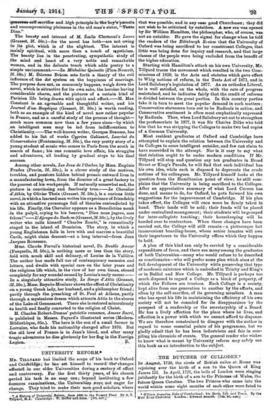UNIVERSITY REFORM.* • Ma. Tg.LYABD haii limited the scope Of
his book to.Gxford and Catabildge; he him set himself to recor&-Telle. changes offeetet1 in our elder 1Juiversities during p century of effort and controversy, For the first thirty yews, of his chosen Teriod his teak is. an easy. one; heyeud imitituting a-few dirmome examinations,: the Univeraltiof itOle, not 9*39r for change. They tried to make their men good scholars, where - , • A u4tpv. UniaserraiN Atform, from tam to tn, Brant Bnut By Mi. (Imbeds° Yr.-Beet ttni rels. Mt.] ' • 'that *as possible, and irt anycase good CM:nehmen ; they did not wish to be criticized by outsiders. A new erawas opened by Sir William Hamilton, the philosopher, who, of coarse, wan nob an outsider. He gave the signal for change when he fold the readers- of the Edinburgh Replete that the University of Oxford was being sacrificed to her constituent Colleges, that little was being done for inquiry and research, and that large classes of the people were being excluded from the- benefit of the higher education.
Starting with Hamilton's attack on hie own University', Mr. Tillyarcl trams the movement which resulted in the two Coin'. missions of 1850, in the Ante and statutes which gave effect to Whig notions of reform, in the Tests Act of' 1811, and in Lord Salisbury's legislation of 1877. As an orthodox Liberal, he is well satisfied, on the whole, with the rate of progress maintained, and he indicates fairly that the credit of reforms is divided between the great parties. In this country parties take it in turn to meet the popular demand in Such matters ; Conservative statesmen turn out to he Radicale in action, and Conservative sentiment is often moat emphatically expressed by Radicals. Thus, when Lord Salisburyset out to strengthen the-professoriate in 1877, it was Sir Charlet) Mike who told. him that he was stripping the Colleges to make two bud eopiea of a German Calamity.
Most resident graduates at Oxford and Cambridge have attempted to explain the relation between the University and its Colleges to some intelligent outsider, and few Can Claim to have succeeded-in the attempt. Nor is it easy to say what that relation 'ought to be under modern conditiOns. If Mr. Tillyaid will stop and question any' ten graduates in Broad Street or King's Parade, he will find that midi has his own idea, while each is disposed to -deprecate the crude notions of his-colleagues. Mr. Tillyard hirtiself looks at the question from the Hamiltonian point of 'view; heetill cont. plains that the University is being sacrificed to the Colleges. After an appreciative summary of what Lord Curzon ha* done, and means to do, for Oxford, he puts forward his own suggestions for the improvement of Cambridge. If his plan takes effect, the Colleges will once more he firmly taken in hand. Their lands will be sold ; their funds will' he placed under centralized management; their studèntswlll be grouped for inter-collegiate teaching; their housekeeping will be handed over to contractors. When these changes have been carried out, the College will still remain—a picturesque but inconvenient boarding-house, whose senior inmates Will owl their importance to the University offices which they happen to hold.
A plan of this kind can onlybe carried by a considerable expenditure of force, and there are manyamong the graduates of both Universities—many who would. refuse to lie described as reactionaries—who will prefer some plan which aims at the fall development of the University while preserving that typo of academic existence which is embodied in Trinity'andRing's or in Balliol and New College. Mr. Tillyard is perhaps toe much disposed to regard a College me, block of .pthperty, of which the Fellows are trustees. Each College is a society, kept alive from one generation to another by UM efforts, and often by the self .sacrifice, of its governing members. A man who has spent his life in maintaining the efficiency of his own society will not be consoled for its disap-peartnce 'by the prospect of a readership or the secretaryship Of S Board. He has a lively affection for the place where 'he lives, and affection is a power With which we cannot afford to dispense. We are therefore constrained to disagree with the author in regard to some essential points of his programme, but we gladly admit that he has been' industrions and fair in corn; piling his chronicle of events. The general reader who wishes to }mow what is meant by University reform may safely use this book as an introduction to the subject.


















































 Previous page
Previous page